Affiliate disclosure: This post may contain affiliate links. Please see our Privacy Policy.
Duck eggs are a delicious alternative to chicken eggs, with extra rich yolks and amazing flavor. Learn differences between duck eggs and chicken eggs, whether you’re raising ducks for eggs, or just happened to find duck eggs at the store.
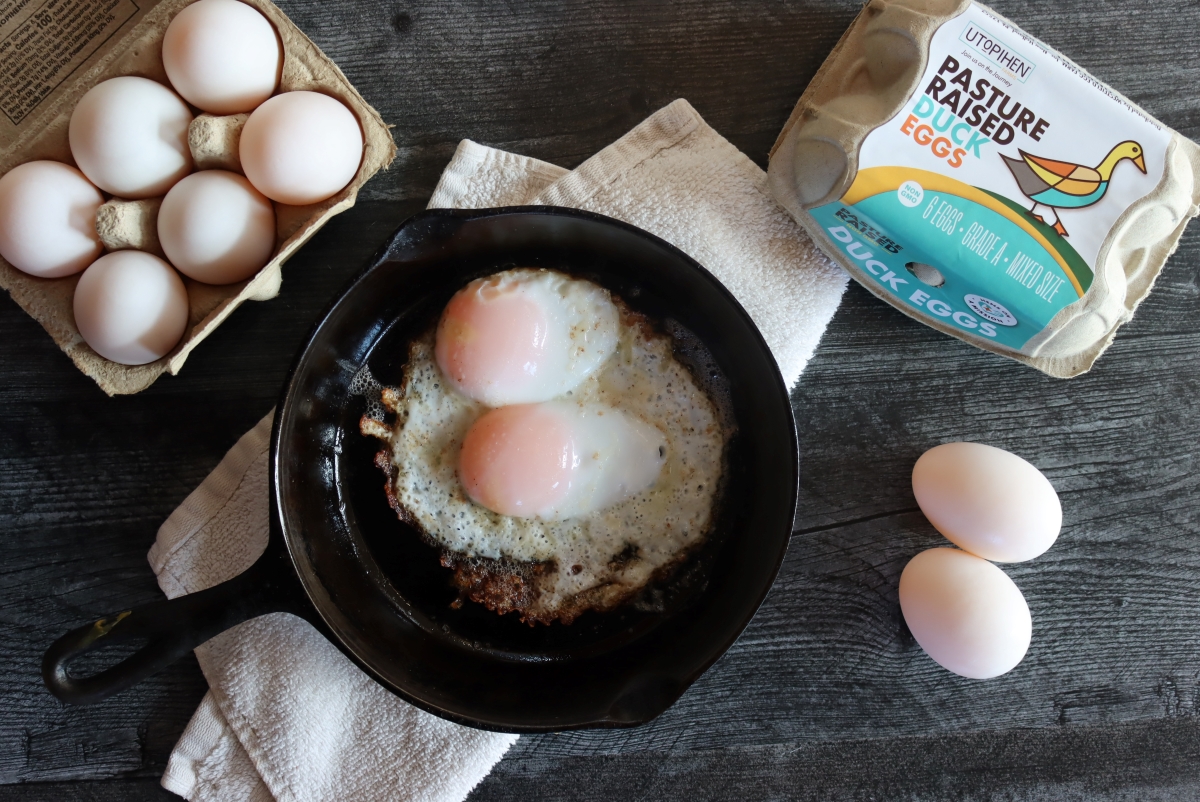
Chickens are the first animal you imagine when you picture eggs, but more homesteaders than ever raise ducks. That brings up the question – what’s the difference between duck eggs and chicken eggs?
I hesitated to add ducks to our homestead, worried that they’d be difficult to raise, but I have to say – they’re great. Ducks are as easy, if not easier than raising chickens. It’s frustrating to keep their brooder clean and dry as ducklings since they want to splash everywhere, but beyond that, they are simple and fun to raise.
Ducks are social creatures, so make sure you have at least three, but five to six is better. They don’t tolerate captivity like chickens do, which means duck eggs are always “free-range.” Since they’re incredibly efficient foragers, that means the eggs get the benefits of wild weeds, grasses, and bugs.
When our ducks laid their first eggs, I was surprised by the size. They are noticeably bigger, and the yolks were larger with more richness and flavor.
We love them, and now that we know the difference between duck eggs and chicken eggs, I’m definitely on team duck rather than team chicken.
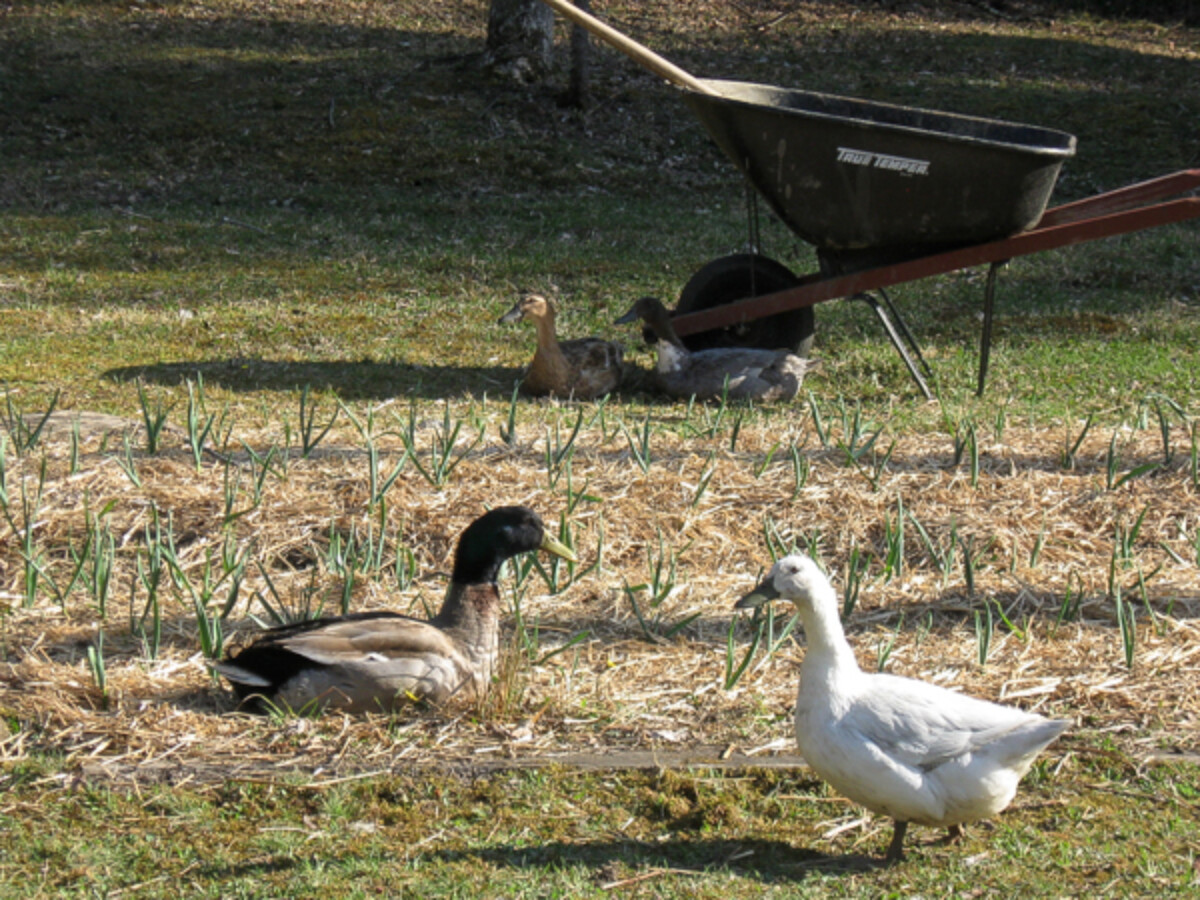
Duck Egg Basics
When people think of eggs, chickens immediately come to mind, but that’s a shame because ducks are valuable backyard homestead animals. They lay consistently throughout the year, and their eggs are large and full of beneficial nutrients to enjoy.
Do Ducks Lay Eggs?
Ducks lay eggs, just like chickens. The total number of eggs laid in a year depends on the breed, and some are more prolific than others. (But that’s true for chickens as well.)
Khaki Campbell ducks are some of the best layers, and they’ll produce 320 to 340 eggs each year, which is very close to an egg a day all year round. In cold climates with short winter days, the total is closer to 300 eggs a year since they pause a bit longer in the coldest part of winter (but so do chickens).
Peking ducks are usually raised for meat, but they still lay about 200 eggs a year, starting in very early spring and continuing until well into the fall.
Can You Eat Duck Eggs?
Of course! Duck eggs are edible; we eat our duck eggs nearly every day. They have a bit more of an eggy flavor, and they taste delicious cooked.
The yolks are much richer and make exceptional french toast, puddings, and custards.
Duck egg whites have more protein, so they whip up to stiffer peaks than chicken eggs, meaning they make excellent meringues and macaroons.
You can cook duck eggs exactly how you cook chicken eggs! They taste great as scrambled eggs, custards, poached, or baked in a dessert.
How Often do Ducks Lay Eggs?
Ducks lay one egg per day, and don’t worry; you don’t need a male duck (a drake) for the females to lay eggs. However, those eggs won’t be fertile without a drake.
Some breeds, like Welsh Harlequin, Khaki Campbell, and Silver Appleyard, lay more eggs per year than the most prolific chicken breeds.
When do Ducks Lay Eggs?
Like chickens, ducks usually lay eggs in the morning hours, from dawn to around noon. That applies to most ducks, but often, as with chickens, you’ll have a rogue that lays on their own schedule.
Chickens usually begin laying eggs at 18 to 22 weeks of age, and ducks are pretty similar. Ducks begin laying at 17 to 26 weeks in age, depending on the breed and time of year.
Do Ducks lay Eggs in the Winter?
One difference to note is that ducks are better year-round layers than chickens. Their egg production continues through the winter without the worry of added light, so if you want consistent eggs, ducks should top your list.
Ducks lay more eggs because they don’t need as much light to stimulate their ovaries. They lay throughout the winter without any worry that dark winter days will cause them to slow down.
Here in Vermont, our winter days are very short, and we won’t see our first dandelion until Mid-May. Our ducks generally take a break from laying during January, but they’ll start laying an egg a day in early February. The chickens won’t start up again until March or April.
How Long do Ducks Lay Eggs?
Something else to consider is that ducks have a longer productive life than chickens.
Chickens lay their peak amount of eggs for one to two years. After that, their production starts to slow dramatically. Ducks lay well for three to four years, keeping up their full production for about twice as long as most chicken breeds.
What Color are Duck Eggs?
Ducks do come in different colors, but not as many as chickens. Duck egg colors are:
- Greenish-blue eggs
- Cream or white
- Charcoal or black
The color egg depends on the breed of ducks that you raise. The Cayuga duck is one of the most popular, and it lays a blackish-green or dark ash color. Sometimes, a Cayuga duck egg is almost perfectly black.
Other breeds lay white eggs or brown eggs. If you want a specific color, make sure you research all of the duck eggs’ colors before buying them.
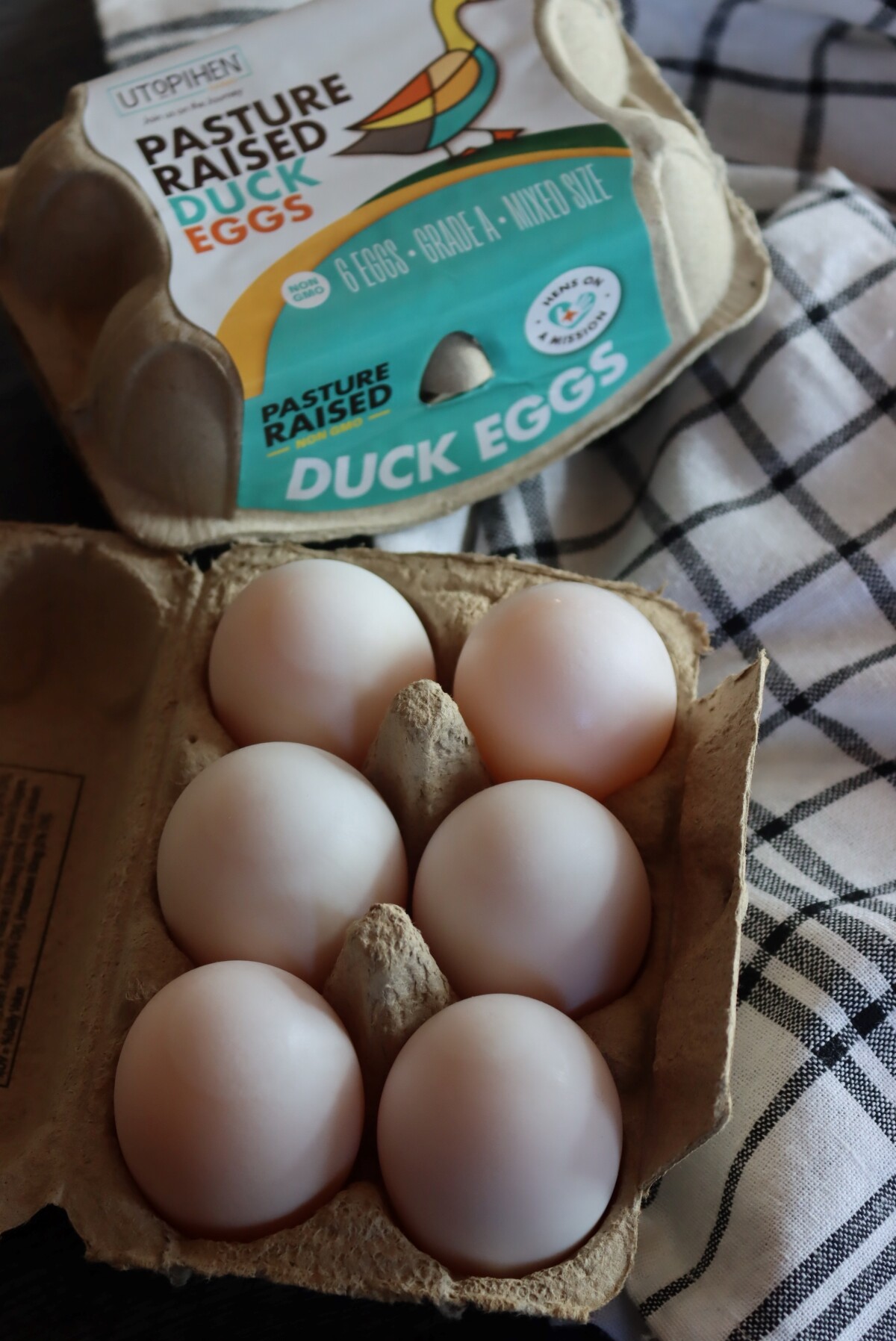
Duck Eggs vs. Chicken Eggs
Both ducks and chickens lay eggs, and the eggs look similar. While duck eggs are generally much larger, the shape is the same. In general, the flavor is similar, with the duck yolks being richer.
Several differences between the two will help you decide if you want to raise chicks or ducks for eggs.
Duck Eggs are Larger
Most ducks lay eggs that are 30% larger than a medium chicken egg, and they’re only slightly smaller than goose eggs. It’s wild that ducks lay eggs significantly larger than chickens, and they lay an egg every day. It takes chickens sometimes two days to lay a smaller egg.
So, if you want to feed your family, ducks produce more eggs, and their eggs are larger, so they’ll go further.
(Keep in mind that ducks also eat about twice as much food per day as the average chicken, so while they lay bigger eggs more often, you also have to feed them twice as much if they’re not foraging freely.)
Duck Eggs Have Stronger Shells
Duck eggs have a much thicker shell than chicken eggs. When you try to crack one for the first time, you’ll notice that you have to give it a bit more of a smack to be effective.
If your kids collect the eggs, this is incredibly helpful. They’re less likely to break when your kids drop one. It inevitably happens. Duck eggs almost bounce, if dropped from a toddler’s basket just a foot or so off the ground.
Duck Eggs Have More Nutrients
Chicken and duck eggs are good for you – without a doubt – but duck eggs are different.
For example, duck eggs contain more healthy omega-3 fatty acids than chicken eggs, improving heart health and reducing inflammation.
Pasture-raised ducks offer more vitamin D in their eggs. Everyone knows that vitamin D deficiencies are too common; vitamin D supports bone health, skin health, and your mood. Ducks spend a lot of time outside, especially pasture-raised ones,
It’s hard to find definitive information, but some sources say that duck eggs have more essential vitamins and minerals, such as niacin, riboflavin, folate, vitamin B6, vitamin E, and vitamin A.
Duck Eggs Have Richer Yolks
Some of the best pastry chefs prize duck eggs because they have a higher fat content. While they have high calorie and cholesterol levels than chicken eggs, duck eggs have a noticeably richer egg yolk.
Since the eggs are more decadent, the whites are super thick. They make fantastic poached or fried eggs. The eggs don’t run as much, and the yolks’ richness makes delicious waffles and custard.
Since duck eggs have more protein and fat with less water, they’re ideal for baking – all baking. Whether you want to make cookies, breads, souffles, cakes, or meringues, duck eggs are the way to go.
Duck eggs have a more “eggy” flavor than chicken eggs, making them more flavorful. Ultimately, the bird’s diet rather than being a duck vs. a chicken is what leads to the different flavors.
Chickens might seem like the best foragers because everyone talks about “free-range chickens,” but ducks are better foragers. The more time they spend on the grass foraging and looking for worms, bugs, and insects, the more eggy and “gamey” the eggs taste.
Duck Egg Whites Have More Protein
Another difference between duck eggs vs. chicken eggs is that duck eggs contain more protein than chicken eggs. They have about 30% more protein, but it’s also a different type of protein.
On average, one duck egg contains 9 grams of protein, and a chicken egg contains 6 grams of protein.
The higher amount of protein is excellent for cooking. It helps the eggs whip up better and has a nicer consistency, unlike other eggs, like goose eggs, that aren’t great for whipping up. The protein makes a better crisp when you have a fried egg. That could also be because the yolks are larger, so you can cook duck eggs for longer without cooking the yolks.
Since they contain different proteins, some people with allergies to chicken eggs can eat duck eggs and vice versa.
Duck Eggs Cost More
The added cost of duck eggs is a reality. Ducks love to eat, sometimes eating twice as much as chickens, and they need some pasture or area to forage to meet their full potential.
However, how much a duck eats varies. Some duck owners say that they feel like they eat less than their chickens.
If you want to sell duck eggs, their added costs are offset by the higher price per dozen that you can charge for duck eggs. Depending on your region, duck eggs sell for $6-12. It’s harder for chefs, especially pastry chefs, to find them. That’s why they fetch a higher price tag.
Duck Eggs Last Longer (Maybe)
Duck eggs have a harder, thicker shell than chicken eggs, and the inner membrane is thicker. It’s believed that the membrane is thicker because wild ducks lay their eggs next to the water, so it needs to keep out any moisture and mud.
Many chicken and duck owners tell you that their duck eggs store for longer than their chicken eggs.
We’ve successfully kept unwashed duck eggs for 3 to 4 months in our cool basement. They won’t keep that long if you wash them or get them from the store so that only works for farm-fresh unwashed duck eggs.
You can, however, preserve eggs in limewater to make them last over a year. This works with both chicken and duck eggs.
Cooking with Duck Eggs
Cooking with duck eggs is pretty simple, depending on what you’re making. If you want hardboiled, scrambled, poached, or sunny-side-up eggs, the process and way to cook them are the same.
Duck eggs are particularly delicious in gluten-free recipes. The extra protein helps to bind the ingredients together, leading to a better texture in the dishes. Gluten-free dishes often have an unappealing texture, but using duck eggs changes that.
The biggest difference in cooking with duck eggs is that you can’t substitute them at a 1:1 ratio in a recipe. Duck eggs are larger, so if a recipe calls for three chicken eggs, using two duck eggs would be the proper amount.
If your duck egg is the average size of a chicken egg, for whatever reason, then it’s safe to substitute 1:1. The general recommendation to follow is two duck eggs for every three chicken eggs.
Duck Egg Recipes
Try any of these duck egg recipes…
- Duck Ramen
- Baked Duck Eggs
- Soft-Boiled Duck Eggs with Bacon and Asparagus
- Chinese Salted Duck Eggs
- Duck Egg Quiche
- Homemade Maple Custard
- Egg Salad with Curry and Dill
Animal Husbandry
Looking for more homestead animal guides and tutorials?
- 8 Reasons to Raise Geese
- Caring for Abandoned Ducklings
- How Much Does it Cost to Raise Chickens?
- Raising Angora Rabbits for Fiber
- Raising Dairy Goats Off the Grid
- How Much Does it Cost to Raise A Pig?
- Raising Rabbits on Pasture
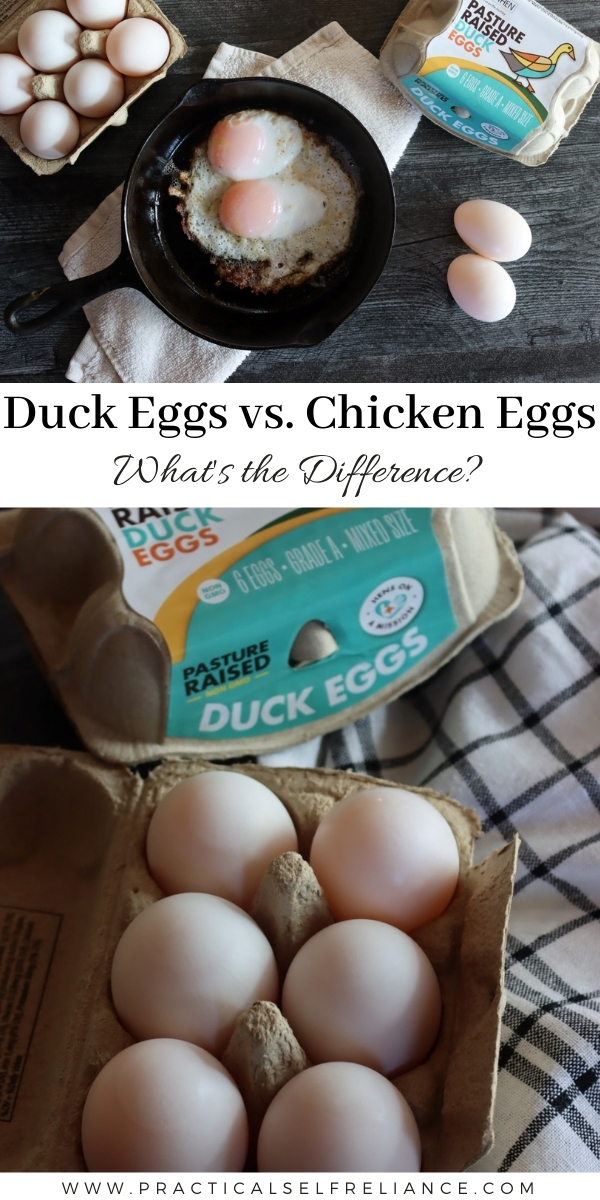
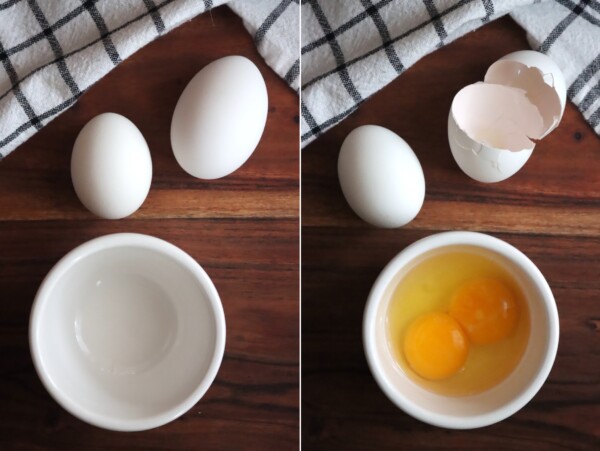
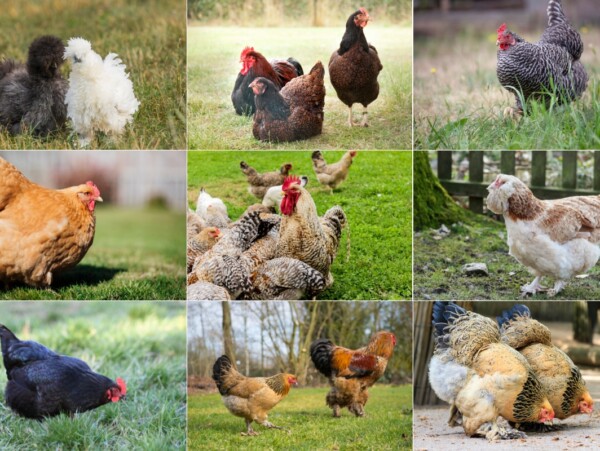
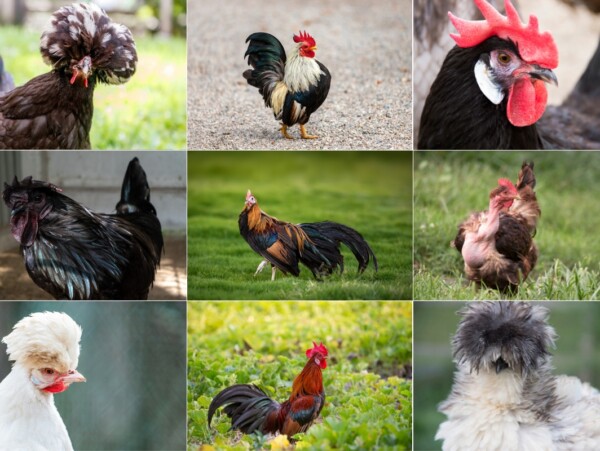
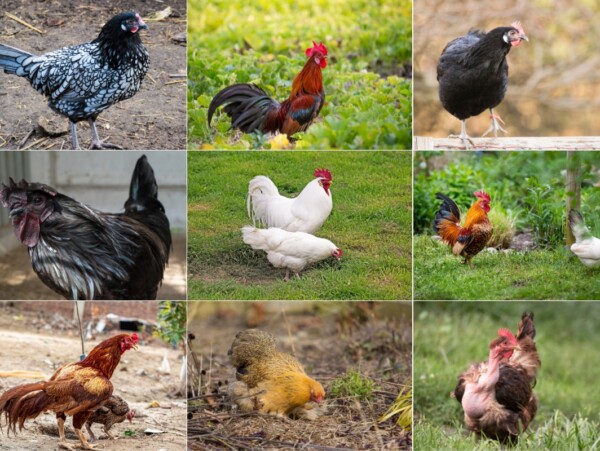









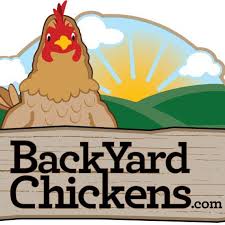
We get duck eggs from the free range ducks at our friend’s farm. They’re so good, and way better than chicken eggs.